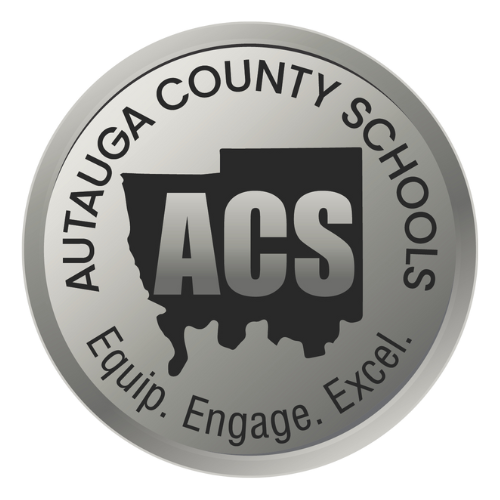
School Health Services
Autauga County Schools’ Health Services Program is designed to maximize an individual’s health potential and provide a broad spectrum of health services to students. These services are provided by highly qualified school nurses to:
- Identify health defects and needs of students
- Assist students in becoming increasingly responsible for their own health
- Promote the optimal level of health for students
- Provide health education and health counseling for students and parents
Health Services Screenings & Assessments
- Vision Screening - performed to screen for visual acuity, muscle balance. Students identified as needing follow-up will be referred for further evaluation.
- Audio Screening - conducted to screen for hearing defects. Referrals are provided to parents of all students requiring further evaluation.
- Health Assessments - conducted to assess normal growth and development. Significant findings will be discussed with the student and/or parent. Blood pressure checks can be conducted upon request. Health counseling regarding nutrition, exercise, and lifestyle will be provided. Appropriate referrals will be made when necessary.
- Scoliosis Screenings - conducted to determine if a lateral curvature of the spine is detected during the adolescent growth period. Alabama law requires that all schools offer screenings for students between the ages of 11 and 14 each year. Appropriate referrals will be made as necessary by your child’s school nurse.
- Basic First Aid - performed if a student becomes ill or is injured at school. Parents may be called to pick up the student if deemed necessary by the school nurse. If a serious injury occurs, the paramedics may be called.
Medications
Students who need to receive medication at school must have their physician complete the Alabama State Department of Education School Medication Prescriber Parent Authorization Form. This form must be brought to your child’s school nurse by the parent/guardian along with the prescription bottle before the medication can be given at school. If an over-the-counter (OTC) medication is needed the same rule must apply. A new, sealed bottle of the OTC medication along with the consent form signed by the doctor and parent or guardian must be brought to the health office.
Immunization Documentation
In order to enroll your child in our school system they must have a current updated immunization record (IMM-50 or blue slip). This may be obtained from the local health department, military facility, or your private physician. Call your school nurse for questions related to back-to-school vaccines. Or contact the Autauga County Health Department at (334) 361-3743 for questions related to exemptions or to schedule an appointment.
Required Immunizations
- Diphtheria / Tetanus / Pertussis - five doses or four if the fourth dose was given after the fourth birthday. Tdap booster vaccine at age 11 or 12 before beginning sixth grade. If Tdap booster was not given before entering sixth grade and has not been given since 11 years of age, one booster is required to enroll or register in any grade above sixth grade.
- Polio - four doses or three doses if the third was given on or after the fourth birthday
- Measles / Mumps / Rubella - two doses
- Hib - four doses up to five years of age
- Varicella
Religious Exemption
A parent seeking Religious Exemption must submit a written letter of objection based on religious tenets and practices of the student to the County Health Department in person.
After the parent or guardian receives education counseling from the County Health Department, a Certificate of Religious Exemption will be issued from the County Health
Department.
Medical Exemption
A licensed healthcare provider can provide individual exemptions from the required immunizations or testing on a Certificate of Medical Exemption. The Certificate of Medical
Exemptions is required to be on forms approved by the Alabama Department of Public Health and will be accepted in lieu of the Certificate of Immunization.
Online Resources
- Alabama Department of Public Health Immunization Info
- Alabama Immunization Law
- CDC Child & Adolescent Immunization Schedule by Age
Health Care Plans
If your child has a health problem the school nurse will work with you to develop an individualized health care plan to ensure your child’s health needs are met while in the school setting.
Backpack Safety
When you move your child's backpack after he or she drops it at the door, does it feel like it contains 40 pounds of rocks? Maybe you've noticed your child struggling to put it on, bending forward while carrying it, or complaining of tingling or numbness. If you've been concerned about the effects that extra weight might have on your child's still-growing body, your instincts are correct. Backpacks that are too heavy can cause a lot of problems for kids, like back and shoulder pain, and poor posture. The problem has grabbed the attention of lawmakers in some states, who have pushed for legislation requiring school districts to lighten the load. Read more backpack safety from the National Safety Council website. For additional resources, click on the links below.
Meningococcal Disease
Meningococcal disease is any illness caused by the bacteria Neisseria meningitidis, and is the leading cause of bacterial meningitis in children 2-18 years of age in the U.S. It can be very serious, even life-threatening in 48 hours or less. The two most severe and common illnesses caused by meningococcal bacteria are Meningitis - an infection of the fluid and lining around the brain and spinal cord, and Septicemia - a bloodstream infection. Meningococcal disease is spread person-to-person by sharing respiratory secretions - through kissing or coughing, close or lengthy contact - and among people who share a room or live in the same household. Some people can "carry" meningococcal bacteria in their nose and throat without getting meningococcal disease, but can still infect other people. Most cases of meningococcal disease are spread by people who "carry" the bacteria with no symptoms, appear to be random, and not linked to other cases. Meningococcal outbreaks can occur in communities, schools, colleges, prisons, and in other high-risk populations.
Meningococcal vaccine(s) is recommended for all preteens and teens. All 11 and 12 year olds should be vaccinated with serogroups A, C, W, and Y meningococcal conjugate vaccine (MCV4). A booster dose is recommended at 16. Teens and young adults, 16 through 23 year olds, may also be vaccinated with a serogroup B meningococcal vaccine (SBMV), preferably at 16 through 18 years old. Both MCV4 and SBMV can be given at the same time, so speak with you healthcare provider. People at increased risk (ex: no spleen or poor spleen, autoimmune disease) during an outbreak, should be vaccinated.
Meningococcal Disease Symptoms
- Sudden onset of a high fever
- Headache
- Stiff neck
- Nausea
- Vomiting
- Increased sensitivity to light
- Rash
- Confusion
- Severe aches and pain in the muscles, joints, chest or belly
Seasonal Flu
Influenza season, or flu as it's commonly know, typically runs from October through May. The Centers for Disease Control and Prevention (CDC) recommends that everyone six months and older, with rare exceptions, get a flu vaccination every season. Flu vaccines can reduce flu illnesses, hospitalizations, and deaths. Autauga County Schools partners with Health Hero to provide optional flu vaccine clinics at schools. Event specific information is shared via ParentSquare.
Online Resource
Notes from the Nurse
Regular attendance at school is encouraged and is necessary for your child’s progress. However, students should stay at home if they have any of the following conditions in order to prevent the spread of communicable diseases to others.
- Fever – temperature of 100.4 or above. Child should remain home until fever free for 24 hours without fever reducing medication or on antibiotics for 24 hours.
- Vomiting – your child should not attend school if they have vomited within the last 24 hours.
- Diarrhea – Your child should remain home if they have had diarrhea within the last 24 hours.
- Undiagnosed rash – Your child should not attend school until the rash has been diagnosed and treated. It could be measles, chickenpox or some other contagious disease.
- Pink Eye (conjunctivitis) – Pink eye is contagious. Your child should be seen by your doctor and treated before returning to school.
- Lice and/or nits (eggs) – Your child should not return to school until he/she has been treated with a lice shampoo and removed as many nits as possible You must accompany your child upon his/her return to school and bring a receipt for lice shampoo. Take your child to the office to see the school nurse.
- If your child has COVID-19 symptoms such as cough, fever, chills, shortness if breath, extreme fatigue, or sore throat, please keep them home and contact your health care provider.

